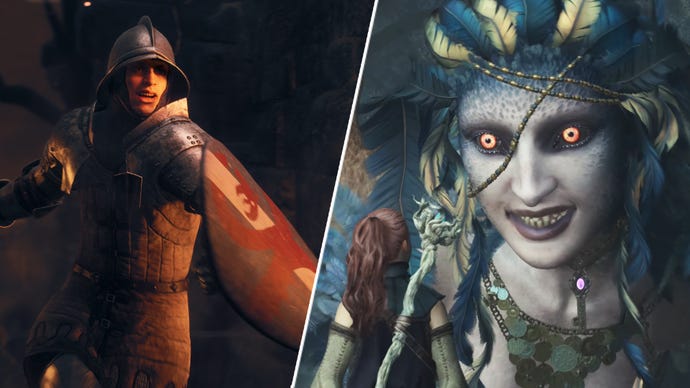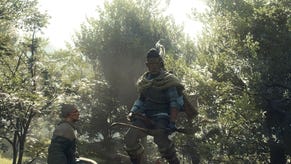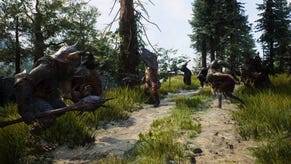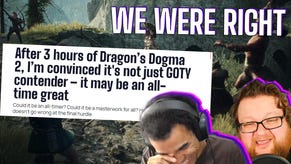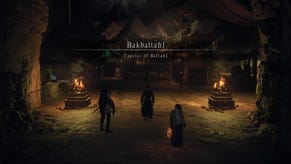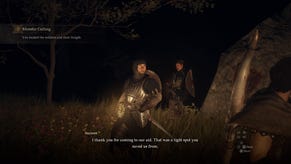Dragon’s Dogma 2 is more of the same (which means it’ll probably be a stone-cold classic) – HANDS-ON
This is like the first game, but better, which means Dragon's Dogma 2 is likely to be unstoppably good.
I hate to navel-gaze about the nature of this job, but game previews are strange. Sometimes they’re easy, sometimes they are hard fought. Dragon’s Dogma 2 is one of those previews that hasn’t come easily.
That’s why this preview is a little bit late, actually – I’d rather try to come at you with something good, and considered, than just guff out a generic impression in a rush amidst the madness of Tokyo Game Show. During TGS, I got to play Dragon’s Dogma 2 at Capcom’s UK offices, experiencing an extended and slightly less limited version of the build that was available on the TGS show floor for around an hour. But… it’s a tough game to write about.
It’s tough because, as a proof-of-concept, this Dragon’s Dogma 2 demo is simple. It’s arguably too simple. What do I mean by this? Well… it’s the first game. It’s the first game, but better. The first game was a misunderstood gem, a cult classic. The second aims to bring the things that made it so to a wider audience.
I could end the preview there, in a sense. What more do you want? It’s a follow-up to one of the best cult hits ever, and it’s resoundingly choosing to build carefully on those foundations rather than reinvent the wheel. Add to this the fact that Dragon’s Dogma is a slow burn, the sort of game that sinks its claws into your very soul over the course of hours. That means that a one-hour demo with Capcom staff hovering over your shoulder so you don’t stumble into a bit of the world they aren’t ready to show yet is obviously not the best way to get to grips with it. Thus, here we are, penning the difficult preview.
.png?width=690&quality=70&format=jpg&auto=webp)
There are things to say, however. Dogma 2 moves over to Capcom’s RE Engine, bringing with it the technical prowess that has made many recent Capcom games absolute bangers. There are clearly lessons learned both from Capcom successes like Monster Hunter and Dragon’s Dogma’s RPG peers that have launched in between the last game and now.
The promise of the first Dragon’s Dogma was always a Japanese take on a particular type of RPG, one that back in the 2000s was taking gaming by storm. The Elder Scrolls 4: Oblivion was an obvious touchstone for the developers – but then Dragon’s Dogma ended up coming out shortly after Skyrim. In a sense, that sealed its fate as a cult hit rather than a mainstream success. But now Capcom is back, lessons learned, and other modern RPGs since clearly considered and analyzed.
More than anything, though, the greatest influence on the original is what the first Dragon’s Dogma was not. Series director Hideaki Itsuno has been fairly honest over the years, detailing in various talks and interviews the many ways in which that first title ended up compromised in order to ship. They didn’t have the time, or the technology, or some mixture of the two - and so things got dropped. The size of the world scaled back, elements of its multiversal multiplayer aspect were tweaked, and even things like playable non-humans were plucked from the game. All of these things, incidentally, are on the slate for Dragon’s Dogma 2.
.png?width=690&quality=70&format=jpg&auto=webp)
One can sense that this is the real mission: to return to the original vision from 2012 and finally build it the best it can be with 2023 know-how and the surprisingly versatile RE Engine. The result is a game that, at a glance, feels pretty indistinguishable from its predecessor. But is that such a bad thing, if the predecessor is one of the greatest of its generation?
Over the course of my hour-long demo, a lot of my consideration is on the little things. If a Griffin elects to take off, you can totally jump on it and grab it – and actually be carried across the map with it. Before, you’d be shaken off, but the sense of scale now means that you can soar above the land. Your AI-controlled Pawn companions talk more – not just to you with their nattering about the world and what’s going on, but also to each other, praising and bickering in a way that makes the party of adventurers feel alive.
A lot of these little things feel as though they’re going to add up to a greater, more changed whole experience, though - which is why an hour is seldom enough. The world is now seamless, for instance, which means things can happen like aggroed enemies following you into town. You can follow where this will lead - ‘emergent AI’ moments that’ll make for great stories and memes. Much of what made Dragon’s Dogma great was the emergent nature of its play. Here, there’s more variables than ever.
.png?width=690&quality=70&format=jpg&auto=webp)
For all the ways in which it expands, however, it’s reassuringly similar. In a funny way, despite being a sequel to a game that merely did okay, Dragon’s Dogma 2 has a clear and beautiful reverence for its predecessor. When you fight a larger enemy and it is weakened, the musical score trills in exactly the same way it did a decade ago. The hairs on the back of my neck stand immediately. It’s awesome not just because of the nostalgia, but because that music cue is bloody awesome to begin with. Of course they haven’t changed it.
If you didn’t play the original, all you really need to know is that Dragon’s Dogma 2 is an open world RPG with a huge explorable landmass, emergent gameplay, and a thrilling action RPG combat system that I’d best describe as ‘crunchy’. The combat is driven by ‘Vocations’ (a posh word for classes), each defined by equipable specials and one more iconic skill. Many Vocations appear to be returning from the previous game, though some are tweaked or replaced.
They fit into the categories you’d imagine: the Fighter is like a knight, equipped with a fine blade and a shield as useful for bashing enemies as it is for defending. The Thief is rapid, able to close distance in a flash and deliver devastating blows while dodging rather than taking damage. On and on it goes, and in the final game there’ll be advanced vocations, as well as a huge range of skills for each vocation to unlock, just as in the original.
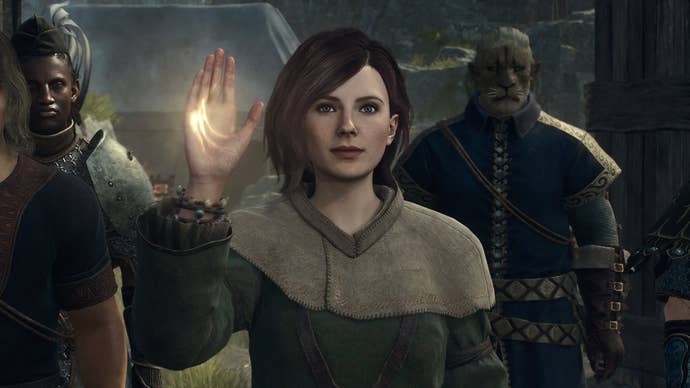
The most unique bit of Dragon’s Dogma was always the previously-mentioned AI companions, the Pawns. The logic here is simple: you create one pawn, and they live and exist with you always. You can then hire two more through a portal – and when you do, these characters are coming through the portal through other people’s games. Your pawn, too, will be recruited to assist others in parallel worlds. Pawns carry knowledge of their exploits from other games, so you might enter an area and your Pawn might advise you where a secret is, or let you know the weak point of a new enemy you’ve only just discovered, because they’ve fought it with someone else. It’s very clever, and it’s a canny alternative to true online co-op.
The result is a game that has the feeling of traveling with ‘living’ companions, at least to some degree – but with developers able to exert the level of control only really available in offline-only games.
World interactivity is a major part of the first game and, indeed, this sequel. And looking at it in a 2023 context, it’s hard not to look at some of this and think a little about Breath of the Wild. Dragon’s Dogma was ahead of its time. In this demo, a lot of this same interactivity remains, where you can use the environment to trigger and reverse traps laid by goblins and the like. My favorite moment of the whole demo was realizing a group of lizard men I was fighting were backed up against a cliff edge – so I stunned one of their mates, picked them up, and then threw them at the group, sending them all plummeting to their deaths. It’s good stuff.
.png?width=690&quality=70&format=jpg&auto=webp)
In fact, it’s really good stuff. So, too, was the original. If this game is truly that – a better, more feature-complete version of the original Dragon’s Dogma vision set in a larger and more interactive open-world… I’m cool with it. Sometimes iteration isn’t reductive; often, in fact, it’s the smart thing to do.
I look forward to seeing what else Capcom has up its sleeve, though. I do get the impression that there’s more to this game than might first meet the eye. But, at first blush, even if samey, this is exactly what I wanted. And it’s likely to be unstoppably good.
